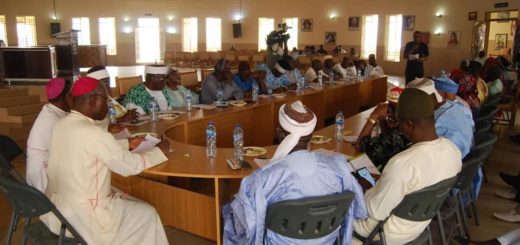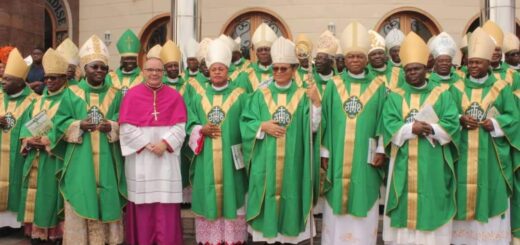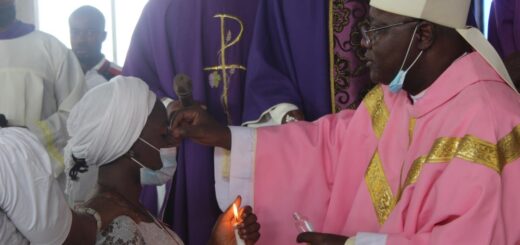TEACH US TO PRAY
by ARCH BISHOP · July 7, 2024
ARCHDIOCESE OF ABUJA INAUGURATION OF THE YEAR OF PRAYER, 2024, AT ST. CHRISTOPHER’S CHURCH, GAMES VILLAGE, ABUJA. HOMILY BY ARCHBISHOP I.A. KAIGAMA, 06.07.2024
TEACH US TO PRAY
The Archdiocese of Abuja is gathered here to inaugurate the Year of Prayer as desired by the Holy Father when he pronounced its launch on 21 January 2024, in preparation for the 2025 Jubilee Year. This is to enable us recover in greater measure the desire to be in the presence of the Lord, to listen to Him and worship Him.
Prayer was an integral part of Jesus’ life and ministry. Prayer should therefore, be the oxygen of our Christian heartbeat. At the beginning of Jesus public life when the Spirit descended and the Father spoke words of approval, Jesus was praying. He spent forty days praying and fasting in the desert. Mk 2:35 says that Jesus, rising very early went off to a deserted place and prayed. Before choosing His Twelve Apostles, He departed to the mountain to pray, and He spent the whole night in prayer. Jesus prayed a prayer of thanksgiving when His disciples returned from a successful missionary journey, a prayer of gratitude and praise, (cf. Mt 11:25-26). It was after observing Jesus at prayer that one of His disciples asked Him to teach them to pray and Jesus then taught them the Lord’s Prayer (cf. Lk 11:1-4). Even at the peak of His suffering, culminating in His death, Jesus did not stop praying. He prayed for His glorification, for the unity and holiness of His apostles; He prayed at Gethsemane, and at the end, on Calvary, he prayed, “Father, into your hands I commend my spirit” (Lk 23:46). In His prayers we learn how to pray the prayer of praise, gratitude, submission, trust and petition.
In this age when secularism dominates and some people prefer to exclude God from the world, we must listen to St. Paul’s advice in 1 Thessalonians 5:17, to “pray without ceasing.” We know that the great progress today in communication technology, space science, and the so-called civilization of those who used to be dependent on God, but now do no longer see the need for God, not to talk of praying or taking prayer seriously, are all thanks to the inspiration of God.
Dear friends, we welcome you to Games Village parish, not because we have come to play some games, but to collectively express the relevance prayer plays in our lives. When you remove prayer from the activity of many Nigerians, they will spiritually suffocate badly and their hope of overcoming crises, violence, social challenges etc, will be completely dashed. Prayer helps us to keep going, even against all odds. With the multidimensional problems of Nigeria, without the persistent and hope-filled prayer, we would have perhaps, fallen deep into the darkest abyss of depression and sorrow.
The inauguration of the year of prayer redirects us to do even more what we are already doing in private or public. The Holy Father, Pope Francis, wants us to deepen our relationship with God through a deeper prayer life. We know how every Catholic is taught to pray, beginning with the sign of the Cross. And progressively, we learn how to pray with our own words or in meditation or contemplation or praying with the word of God (Lectio Divina). Many of us can achieve many of our needs with our hands and talents, but more easily on our knees, i.e. when we are men and women of prayer.
For most of us, especially in Africa, our worldview (Weltanschauung) is theocentric. Even before the advent of Christianity our customs and traditions indicate that a Divine and Supreme Being exists. In my language, God is called “Kurumam,” “the Chief Creator.” Is it not surprising that among the Igbos, even before the advent of Christianity, they already bore such names as:
Soranyitoochukwu – join us in praising God; TobeChukwu – be praising God.
Chukwudumebi: God lives with me.
Chukwudaalu- Thank God.
Chukwuabiama – All-knowing God
Eberechukwu – God’s Mercy
Ikechukwu – God’s Power
Chukwuebuka – God is so great.
Christianity has taught us about Jesus the Way, the Truth and the Life, and has helped to purify our methods, style, motives and manner of prayer. We are taught not to take God as a policeman, to whom we run only when in trouble or to see God only as one who solves our problems, just like the man who was not used to attending morning Mass but when his shop got burnt during the night, he was the first to be in Church for morning Mass!
Christianity teaches us that our God is Abba, a Dad, that familiar title Jesus used in addressing God, one who is caring and powerful, forgiving and willing like the father of the prodigal son, to let us back to His pure love unconditionally.
What the Pope is teaching us is that, prayer should not become a mere recitation of formulas. We ourselves know that we pray a lot. We pray a lot in our crowded churches and that is why Nigeria is rated as one of the countries with the best Mass attendance. As many as 94 percent of self-identified Nigerian Catholics surveyed, said they attend weekly or daily Masses (a study published in early 2023 by Georgetown University’s Center for Applied Research in the Apostolate).
We must pay attention to the words and phrases we pronounce at prayer. We must pray from the depth of the heart like the psalmist who says, “Out of the depths have I cried unto thee, O LORD. Lord, hear my voice: Let thine ears be attentive to the voice of my supplications.”
We must progress from what we were taught at home as basic prayers or at catechism, to be able to articulate our prayers to God; personally engage God, as Abba, Father, in our conversation, talking naturally to God, using body, mind and soul to reach him, not just about a mechanical repetition of words. We sometimes talk about “saying Mass,” or “reciting the rosary.” We do more than that. We celebrate the Mass and pray the rosary.
While we pray and wait for God to bless the works of our hands. Prayer alone will not solve every problem, neither will folding our arms and waiting for either the government or our neighbours or friends to act for us. All must go together. It is a personal as well as a collective duty to make life better for everyone. So, we must do more than trust in God. We must also make a move, we must take a step farther to approach God, through prayer and hard work. God never intended prayer to be a substitute for hard work. St. Ignatius describes our cooperation with God this way: “We must work as if everything depends on us, but we must pray as if everything depends on God.”
We know how Elijah ridiculed the prophets of Baal in 1Kg 18: 27 saying, “Cry out with a louder voice. For he is a god, and perhaps he is talking, or at an inn, or on a journey, or certainly he may be asleep, and must be awakened.” Our God is omnipotent, omniscient, omnipresent, and we must approach Him unfailingly everyday from our moment of waking up to the time we go to bed, using verbal or non-verbal means to communicate with Him. (The experts call it kataphatic or apohatic ways of prayer).
Dear friends, remember your prayer at waking, meal times, work, angelus, Mass, Lectio Divina, etc. The greatest prayer that contains all is the one taught by Jesus which is the theme of our Year of Prayer.
The Our Father is the prayer that summarizes all prayers. Before anything is asked for ourselves, we give God the glory, the reverence due to Him comes first and other things we need follow. We ask for ourselves our daily bread, bread for the day as in Ex 26:11-21, where only what was needed for the day was gathered. That is to say, we not to worry so much about the future but to live one day at a time. We then pray for past sins, asking for forgiveness knowing that the best of us is a sinful person before God. This prayer covers future trials, when we are tempted, seduced by sin and the devil who goes around like a roaring lion seeking to devour us. The Our Father awakens all kinds of holy desires in us and sums up all we ought to pray for in the presence of God. Our fervency, consistency, intensity, and persistence must be like the friend who in the middle of the night asked for bread for his late-arriving friend. God our Father will give us what we ask if we ask consistently God like a good Father will give us not stone, but bread, not serpent but fish, not a scorpion but an egg. When God does not give us what we need, it is because He has done other things for us. There is no such thing as unanswered prayer, what we get is the answer of the love and the wisdom of God whose ways are not our ways.
Things I suggest we do more during this Year of Prayer:
- Avoid panic prayer, i.e only approaching God in terrible situations. Be calm when you approach God like Hannah in 1 Samuel 1:2 – 2:21. If you must verbalize your prayers, do so with decorum.
- Learn the Our Father in your language.
- Do Eucharistic Adoration.
- Own your Bible, CCC (Catechism of the Catholic Church), Vatican II, Canon Law
- Concentrate on the four Vatican Documents (the Constitituion) suggested by the Holy Father.
- Engage more in family prayer (especially the rosary).
- Engage more in Neighbourhood prayer.
- Pray for the consecration of our Archdiocese to Our Lady on the 10th of August, 2024.
- Pray for the FCT, Nigeria and the Universal Catholic Church.
- Use your fingers to remind youself on what to pray for:
Thumb: closest to our heart – pray for those we love dearly, parents, relations, friends, etc.
Index finger – represents those who teach and train others: teachers, priests, pray for them.
The middle finger – represents the leaders: political, religious, traditional, etc. President Tinubu, National Assembly Members, Senators, Governors, Judges, that they will find the best way to deal with hunger, poverty, violence and criminality in the land.
The ring finger (referred to as the weak finger in piano): pray for the poor, unemployed, the hungry, displaced, helpless and unjustly treated.
Little finger: pray for yourself. You cannot give what you don’t have.




